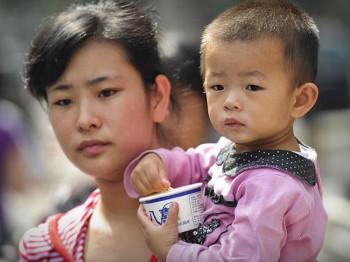An article circulated widely on China’s Internet, listed 15 things Chinese people find most worrisome.
Local government debt and problems related to the housing market were listed most prominently. A large number of items related to social injustice were also named, including farmland expropriation, poverty, mining accidents, mass protests, and the death penalty.
The article’s authors refrained from directly pointing a finger at the communist regime for the cause of these problems, which may explain why it wasn’t deleted by Internet censors right away.
It also didn’t mention many other troubling things in China, deemed sensitive, such as suppression of free speech and religious belief, unlawful detention of rights lawyers and rights activists, re-education through labor, forced abortions, intellectual property theft, toxic food, extreme air, water, and soil pollution, to mention just a few.
The article started out saying: “We have entered an era where every move by the ‘Middle Kingdom’ either boosts or damages the global market. If China does not collapse, it will become the world’s largest economy. But if China does collapse, what will happen then?”
It also stated that the most important development during the past 20 years has probably been China’s rise, that China’s impact has exceeded the United States in many fields, and that China will soon be the largest economy in the world.
“Of course, the assumption is that China will not collapse,” it said.
It then listed what it called, “The 15 most shocking and frightening facts about the Middle Kingdom.”
1. Local government debt
Since 2008, local government debt in China has increased from US$235 million to US$1.6 trillion.
2. Real estate bubble
Do you think the U.S. is trapped in a real estate bubble? Take a look at Hong Kong. Since 2003, Hong Kong’s house prices have tripled.
3. Income versus housing costs
If a Beijing resident would use his entire annual income to purchase a home, according to the average estimation, he could only buy about six square feet.
4. Forced land expropriation
In the past 17 years, the Chinese regime forcibly acquired the land of approximately 140 million farmers. This estimation is based on statistics on acquisition of farmland from 1994 to 2006, quoted by the New York Times. Forced land acquisition is continuing to the present day.
The process of developing a profitable real estate market through land sales has also put many cities under increased pressure [to expropriate land]. According to statistics from the National Bureau of Economic Research in the U.S., many cities’ reliance on income from land sales is unprecedented. Due to land acquisition, in the past year alone, farmland in China has shrunk by 8.33 million hectares, which is approximately the area of South Carolina.
5. Mining accidents
In the past five years, 16,810 Chinese mine workers have died in mining accidents.
6. Natural resource consumption
China consumes 53 percent of the world’s concrete, and operates 48 percent of iron mines and 47 percent coal mines. It also consumes other products in large quantities.
7. Urban construction
By 2025, high rises built in China will be equivalent to 10 New York cities. Total new construction will be 5 million buildings with a total interior space of 40 billion square meters, including 50,000 skyscrapers.
8. Real estate vacancies
China has approximately 64 million empty houses. Some cities are even called ghost cities because no one lives there.
9. Credit card debt
In the coming five years, China’s credit card debt will increase 600 percent. In 2011 alone, consumer credit card debt rose to US$93 billion, up from US$63 billion.
10. Poverty
Over 500 million Chinese live on less than US$2 per day.
11. Mass protests
Every day, an average of 493 group rights campaigns happen in China. According to the UK’s Daily Telegraph, Chinese scholars estimated that last year alone, the number of protests and strikes in China reached 180,000. As China faces food price inflation, corruption, and increased pressure from other areas, social instability is also increasing.
12. Desertification
China’s vast Gobi desert is approximately the size of Peru. Because of water resource depletion, deforestation, and overgrazing, the desert area is spreading by 1,400 square miles per year.
13. Smoking
Chinese people smoke 55,000 cigarettes per second.
14. Stock market
If you buy Chinese stocks, you are basically giving money to the Chinese communist regime. Seven out of ten stocks are owned by the regime, namely: Petro-China, Commercial Bank of China, China Petro-Chemical, Bank of China, China Shenhua Energy Company Limited, China Life Insurance Company, and Bank of Communication.
15. Death penalty
The number of people getting the death penalty and being executed in China is three times the number of all the rest of the countries in the world combined.
According to statistics by Amnesty International, at least 1,718 people were executed in China in 2008--three times the number of all other countries in the world. Some analysts even believe that close to 6,000 people are executed every year.
Read the original Chinese article.
[email protected]
The Fifteen Things Most Worrisome to Chinese
An article on China’s Internet listed “The 15 most shocking and frightening facts about the Middle Kingdom.”
|Updated:


